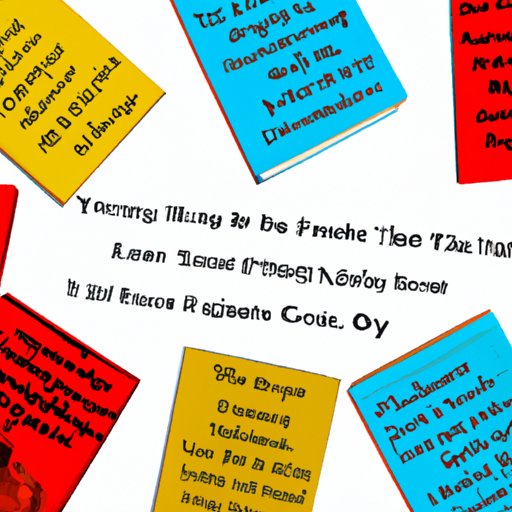Introduction
Young adult (YA) literature is a genre of books written for readers between the ages of 12 and 18. It covers a wide range of topics and themes, from coming-of-age stories to dystopian societies. YA literature has seen a surge in popularity in recent years, with authors such as J.K. Rowling and Suzanne Collins becoming household names. In this article, we will explore the history of YA literature, its impact on adolescent development, diverse representation in YA books, popular YA novels and the messages they convey, the relationship between YA books and film adaptations, the role of social media in YA literature, and how these stories can foster empathy and understanding.

A History of YA Literature: From the Classics to Contemporary
The history of YA literature dates back to the 19th century, when classics such as Mark Twain’s The Adventures of Tom Sawyer and Louisa May Alcott’s Little Women were first published. These works, which featured young protagonists and addressed issues relevant to adolescents, laid the foundation for the genre of YA literature. In the 20th century, YA literature evolved to include more varied topics, such as science fiction, fantasy, and coming-of-age stories. Authors such as Madeleine L’Engle and S.E. Hinton helped shape the genre, creating beloved characters and stories that still resonate with readers today.
In the 21st century, YA literature has become increasingly popular. With the success of books like Harry Potter, Twilight, and The Hunger Games, YA literature has become a lucrative market for both authors and publishers. The rise of YA literature has also been accompanied by an increased awareness of the importance of diverse representation in books. As author Ellen Oh noted in a 2015 article, “Diversity isn’t just important in YA; it’s essential.”
How YA Novels Impact Adolescent Development
YA literature has a powerful effect on adolescent development. According to a study conducted by the University of Wisconsin-Madison, exposure to YA literature can help young adults develop their sense of self and identity. The study found that YA literature can help young adults understand and make sense of their own experiences, as well as those of others. Additionally, reading YA literature can help young adults learn about emotions, relationships, and other aspects of life.
YA literature can also have psychological benefits for young adults. According to a 2017 study, reading YA literature can reduce stress and anxiety levels in adolescents. The study found that reading YA literature can help young adults cope with difficult situations and gain insight into their own feelings. Additionally, reading YA literature can help young adults develop empathy and understanding for others.
Exploring Diversity in YA Fiction
Diversity in YA fiction has become an increasingly important topic in recent years. As author Lamar Giles noted in a 2018 article, “Representation matters. It’s not enough to simply see yourself reflected in stories; you need to feel seen.” More and more authors are writing stories featuring protagonists of different races, cultures, and genders, giving readers the opportunity to see themselves and others represented in fiction.
The increased diversity in YA fiction has had a positive impact on readers. Studies have shown that seeing oneself represented in fiction can help boost self-esteem and foster empathy for others. Additionally, diverse stories can help break down stereotypes and promote understanding among readers.

Analyzing Popular YA Novels and Their Messages
Popular YA novels often contain strong messages about society, politics, and morality. For example, The Hunger Games by Suzanne Collins contains a powerful message about the dangers of authoritarianism and the power of resistance. Similarly, The Hate U Give by Angie Thomas conveys a powerful message about racism and police brutality. By exploring these themes in YA literature, authors can help young adults better understand the world around them.
Additionally, popular YA novels often explore complex issues such as mental illness, trauma, and addiction. These books can provide comfort to readers who may be struggling with similar issues, while also helping to destigmatize mental health and encourage understanding and acceptance.

Examining the Relationship between YA Books and Film Adaptations
YA literature has been adapted into film many times over the years. Popular examples include The Hunger Games, The Fault in Our Stars, and To All the Boys I’ve Loved Before. While some adaptations remain faithful to the source material, others make significant changes to the plot and characters. For example, the film adaptation of The Fault in Our Stars changed key elements of the book, such as the ending and the character of Augustus Waters.
While some fans may be disappointed by changes made during the adaptation process, there are also advantages to having YA books adapted into film. Adaptations can help bring attention to lesser-known books and increase readership. Additionally, adaptations can help bring books to life and give readers a new way to experience stories they love.
The Role of Social Media in Shaping YA Literature
Social media platforms such as Twitter and Instagram have played an important role in promoting YA literature. Through hashtags, fan art, and book clubs, readers have been able to share their love of YA books with the world. Additionally, social media has allowed authors to connect directly with readers, giving them the opportunity to discuss their books and engage with fans.
Social media has also had an influence on the content of YA literature. With the rise of online communities, authors have been able to get feedback from readers on their work, allowing them to create stories that are more relatable and relevant to readers.

The Power of YA Literature in Creating Empathy and Understanding
YA literature has the power to create empathy and understanding among readers. By exploring difficult topics and challenging readers to think critically, YA books can help foster understanding and acceptance of others. Additionally, YA books can provide comfort to readers who may be struggling with similar issues, while also helping to destigmatize mental health.
Examples of YA books that promote empathy and understanding include The Perks of Being a Wallflower by Stephen Chbosky, Speak by Laurie Halse Anderson, and Simon vs. the Homo Sapiens Agenda by Becky Albertalli. These books explore difficult topics such as depression, bullying, and coming out, and show readers that they are not alone in their struggles.
Conclusion
YA literature has come a long way since the 19th century, evolving to encompass a wide range of topics and themes. It has a powerful impact on adolescent development, helping young adults understand their own experiences and those of others. Additionally, YA literature promotes diversity and understanding among readers, while also providing comfort and support to those who may be struggling. Finally, social media has played an important role in promoting YA literature, while also influencing the content of YA books. YA literature has the power to create empathy and understanding among readers, and should be celebrated for its impact on adolescent development and society.
We hope this article has given you a better understanding of YA literature and its impact on adolescent development. We encourage you to explore this genre and discover the stories that speak to you. Who knows, you may even find your favorite book!
(Note: Is this article not meeting your expectations? Do you have knowledge or insights to share? Unlock new opportunities and expand your reach by joining our authors team. Click Registration to join us and share your expertise with our readers.)
